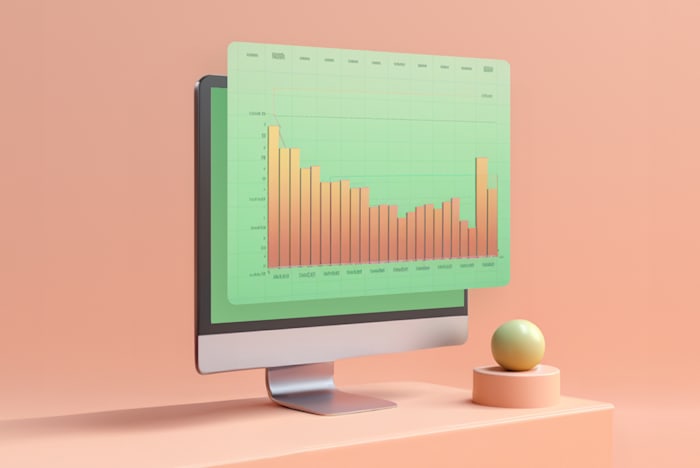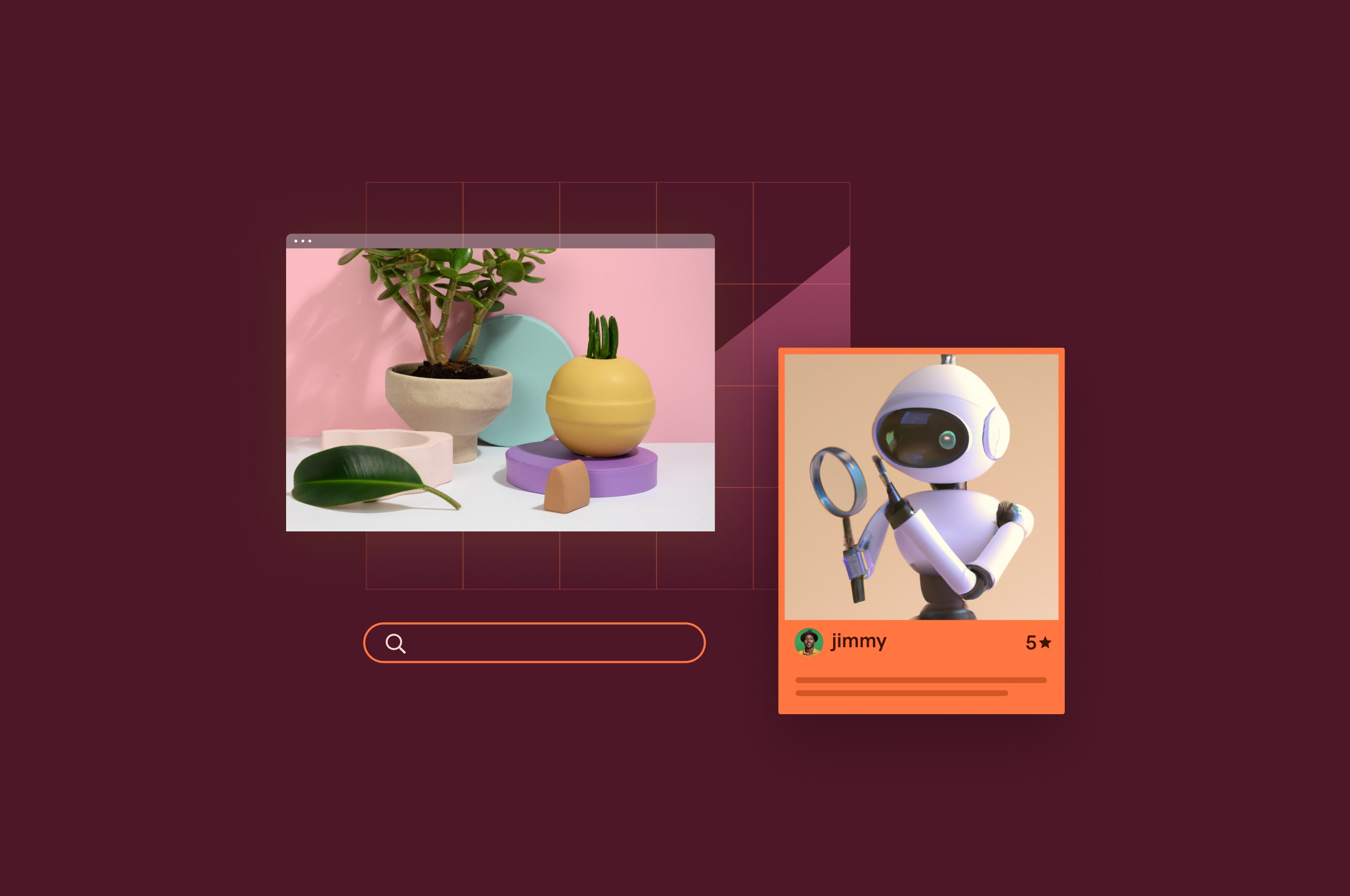AI vs. Human: Creativity, Abilities, and Skills in 2024 (Which is Better?)
Is artificial intelligence coming for our jobs? Learn where the evolving technology surpasses humans, and where it falls short.
 June 16, 2023
June 16, 2023 10 minute reading
10 minute reading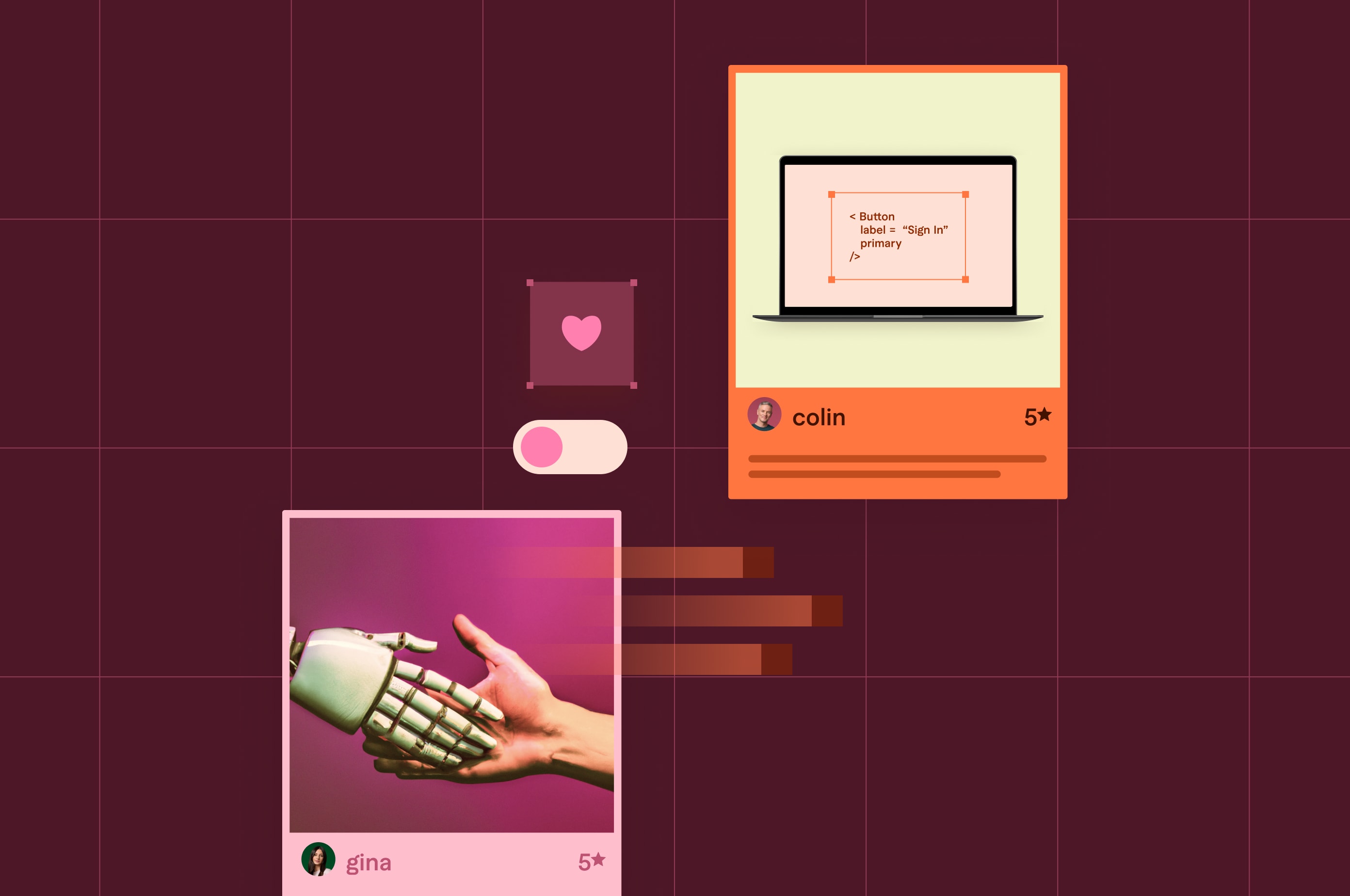
Intelligent machines have become commonplace in our daily life. And subconsciously, we’ve adapted to this new intelligence—speaking keywords into the phone when interacting with AI customer service and relying on autocorrect to fix our mistakes.
The market for artificial intelligence (AI) is projected to grow twentyfold by 2030, up to almost $2 trillion. Though AI continues to integrate into the workforce, that doesn’t mean it’s coming for every human job.
Rather, humans are learning how to work with AI to scale business operations. AI requires a human touch, and it won’t be surpassing human intelligence anytime soon.
What is AI intelligence?
AI is a form of computerized intelligence using machine learning algorithms and processed data to produce answers. AI intelligence is objective, relying on the processing and analyzing of patterns, data sets, and other inputs.
AI intelligence is best leveraged in scenarios where precision, efficiency, and objectivity are valued.
What is human intelligence?
Human intelligence relies on sensory information gathered through experience and can be adapted in response to new situations. Certain emotions—like self-reflection, compassion, and determination—play a large role in human intelligence. This is where AI can’t compare.
Human intelligence is constantly evolving due to changes in life experiences and environments.
Human intelligence is best leveraged in scenarios where moral, ethical, creative, and emotional solutions are valued.
AI intelligence vs. human intelligence
The conversation around AI and human intelligence is becoming increasingly widespread. With AI popping up more in our daily lives, the question arises: Is AI intelligence going to surpass human intelligence?
As of now, the answer is a resounding no. AI still has a long way to go—and may never fully catch up—when it comes to certain aspects of life, like decision-making and social skills. Human intelligence relies on the brain, while AI intelligence relies on the data it has access to. AI intelligence is limited in this matter, while human intelligence is ever expanding.
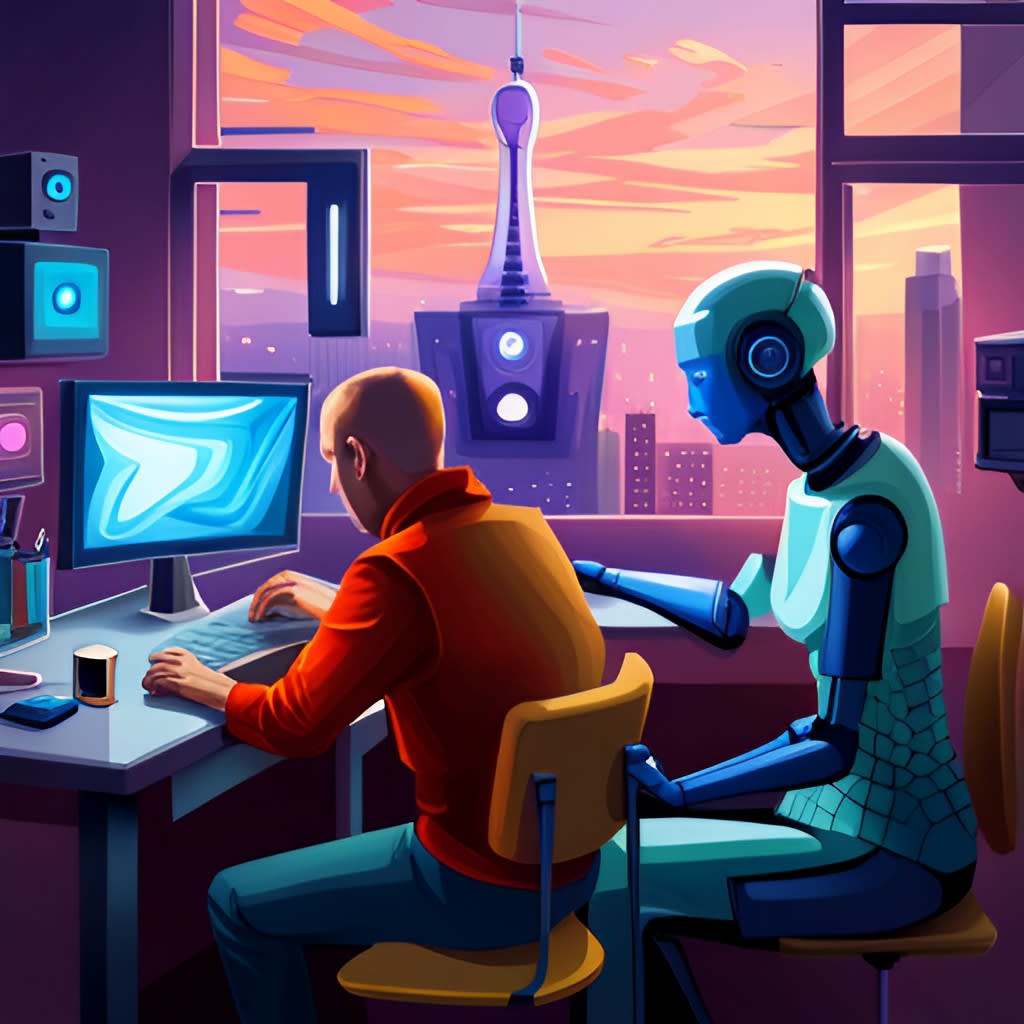
Made by the author using JasperAI
AI vs. human: creativity
Depending on your definition of the word “creativity,” you could argue that AI can’t be creative. Oxford defines creativity as “the use of skill and imagination to produce something new or to produce art.”
Although AI's creativity is impressive, it's limited in that it's only sourced from patterns it's been fed, and it lacks the ability to imagine solutions and new ideas on its own.
Differences
While AI can create new things that appear to be creative, these creations are only based on pre-existing data the technology has access to. Many businesses use AI image generators to create visual content for their brands, but it’s important to note that these images are all based on patterns that already exist.
AI excels at imitation while humans excel at creativity.
Emotions. Creativity is largely based on emotions. The most influential works of art, film, and literature tend to resonate with audiences because the creator drew from their own emotions when executing their creativity.
Intentions. AI doesn’t understand the purpose behind the things it creates. While humans have defined intentions behind the things they create—looking to evoke certain emotions or thoughts—AI can’t do this. The content it produces lacks this intentionality.
Originality. Though AI may appear to produce novel and original things, it’s limited by its programming. Humans can come up with groundbreaking ideas driven by creativity, but AI is confined to data and patterns, unable to produce something truly original.
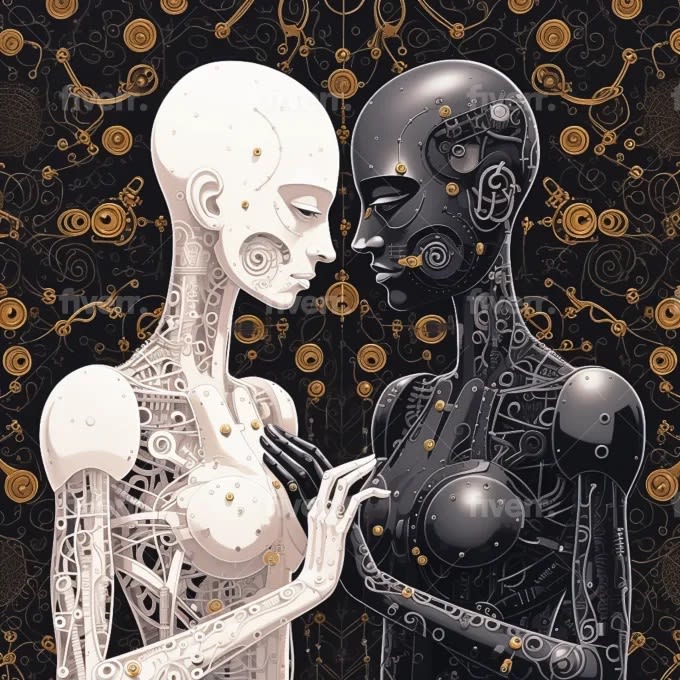
Fiverr freelancer Ai Lani uses Midjourney to produce custom art.
Similarities
Though the differences far outweigh the similarities when it comes to AI and human creativity, there are a few similarities to consider. On its own, AI isn’t too creative, but with a human steering it, the possibilities expand significantly.
Trial and error. AI’s own creativity is constantly tweaked and altered, similar to humans’. Humans can experiment with AI chatbots like ChatGPT and fine-tune its creative endeavors with better prompts to produce a polished final product.
Ability to work with many mediums. With expert prompt engineers behind the wheel, AI produces stunning images, content marketing material, music, and more, much like its human counterparts.
Find an AI artist for your business
AI vs. human: skills and abilities
While AI is becoming increasingly popular and useful in the business world to reduce the amount of time humans spend executing certain tasks, there are some abilities and skill sets it won’t ever be able to replicate.
Differences
Understanding where humans excel and where AI excels is crucial to successfully merging the two intelligences. Unlock the potential of code review or AI for SEO by knowing when to leverage the abilities of AI.
Accuracy. AI is more reliable in terms of accuracy, as it can’t make accidental errors like a human can. Though AI tends to be more precise, its outputs still need to be interpreted by a human. Though AI is good at analyzing data, humans must decide what data should be collected to start with.
Efficiency. The usage of AI is increasing in the workplace because it can perform repetitive tasks more efficiently than human beings. Rather than delegating monotonous tasks to a human worker, businesses are giving these chores to AI.
Leadership. AI doesn’t possess the qualities of a good leader. Leadership requires emotions and relationships. Though AI can make monotonous judgments, that doesn’t mean it’s well-suited to step into leadership roles.
Similarities
AI complements human abilities and skills rather than replacing them entirely. By merging intelligence from both entities into collaborative workflows, businesses can generate more diverse results, leading to new solutions in content creation and content writing.
Problem solving. Humans and AI both solve problems, even if they do so in different ways. AI is programmed to be completely unbiased in its problem solving, while humans usually take other variables into account.
Learning. Humans are constantly taking in new information, learning, and growing from that process. The same can be said for AI. When fed new data and put through training, it can learn new things.

Fiverr freelancer Robert consults companies on using AI for trading systems.
What can AI do that humans can’t?
There are certain tasks that AI will always beat humans in. It doesn’t mean we’re facing an AI take-over anytime soon. But, we’re aware of where machines excel and where to best leverage them.
AI is better than humans at:
Processing large amounts of data. One of AI’s most common uses in the workforce is the automation of repetitive tasks. This frees up time for employees to focus on work that requires more creativity.
Working without rest. AI doesn’t need 8 hours of sleep to perform. It works around the clock, which is why many companies invest in a 24/7 chatbot that’s always available to answer customer service questions.
Identifying patterns quickly. While humans can identify patterns, AI can do it in a fraction of the time and quickly draw conclusions. AI learns from its mistakes, becoming more efficient and accurate in the process.
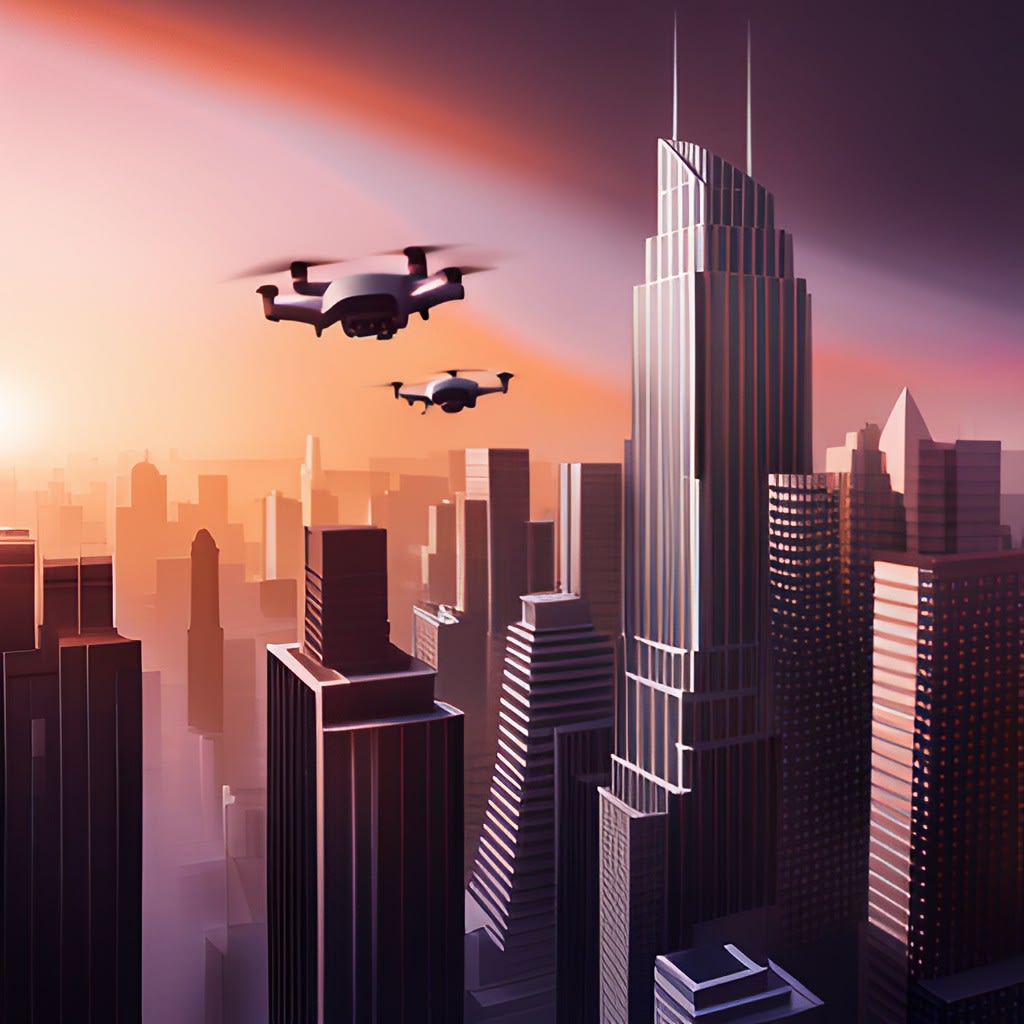
Made by the author with Jasper AI
Many of AI’s biggest benefits need a human eye to watch over them. AI is often limited by its design, and it can’t adapt to situations that it doesn’t have the programming for. Even though AI can make decisions, these still need a human touch—as the nuance and life experience required for complex decision-making are things AI can't possess.
What can humans do that AI can’t?
Humans excel at many things that AI isn’t even close to comprehending. Human intelligence and AI intelligence operate differently. The emotional and physical aspects that make us human aren’t comparable to machines.
Humans are better than AI at:
Emotional intelligence. Machines don’t understand compassion and empathy—two important skills needed when interacting with humans and conducting business. Moral and ethical dilemmas typically can’t be solved when only looking at things through an objective lens.
Developing relationships. Teamwork is essential when running a business. AI doesn’t have emotions or feelings, and these are necessary for developing relationships with coworkers and customers.
Completing physical tasks. AI isn’t able to interact with the physical world in the same way humans can, and it hasn’t come close to mastering the art of dexterity.
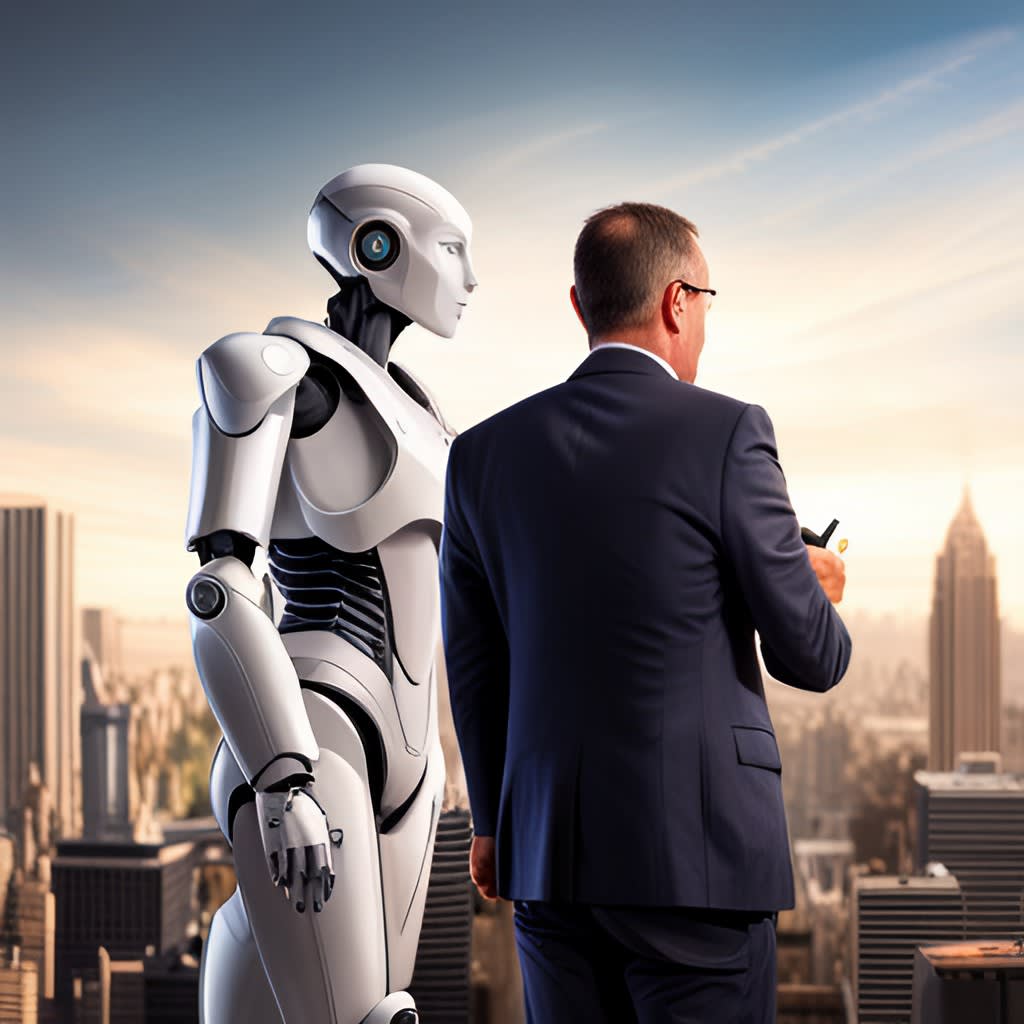
Made by the author using Jasper AI
“I think the big surprise of AI has been that it has primarily gone after high-skilled, white collar industries,” says Marcus Tisdale, founder of Prompt Engineer School. “Ironically, the harder problem is automating blue collar types of work, work that requires manual labor and dexterity, and I think that's primarily to do with a relative lag in robotics and battery innovation.
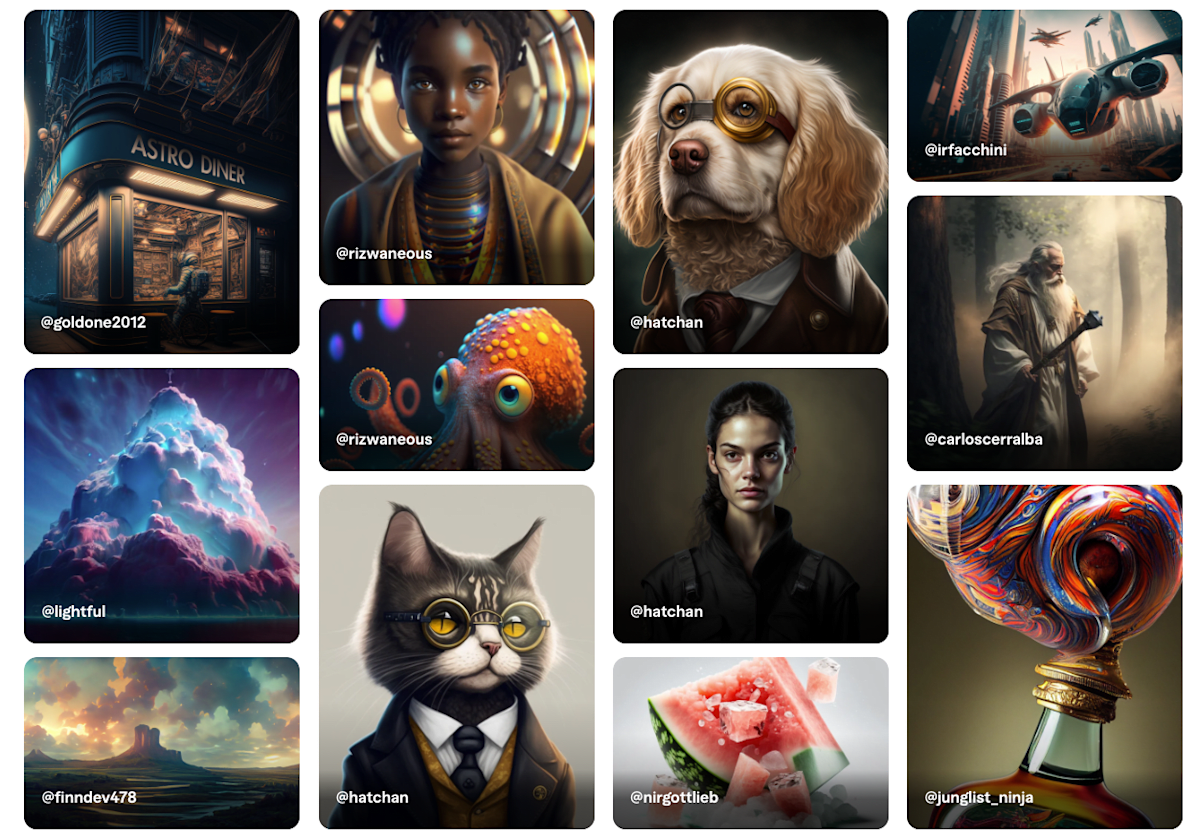
Bring humans and AI together.
AI artists use artificial intelligence to create original visuals from scratch based on input data you give it. This can be anything from simple shapes and patterns to complex, lifelike depictions.
Hire AI ArtistsIntegrating AI into your business operations
There’s no denying that AI has humans beat on certain playing fields. Rather than putting the two entities at war, humans can come together with AI to leverage the unique skill sets they each possess. For example, implement AI into content marketing tasks to speed up processes and become more efficient.
Here’s how to get started:
Stay up to date with AI trends in your industry. Research how competitors and other businesses in your industry are making the most of AI.
Identify opportunities for AI integration. Consider implementing similar solutions for enhanced productivity. Ensure there's still a human touch on all AI-generated materials.
Collaborate with AI experts and vendors. Bring in expert AI freelancers who are proficient in working with various AI tools.
Develop strategies for leveraging AI and human partnerships. Monitor success of campaigns and derive new ways to collaborate with AI.
Consumers are getting used to AI, evident by their amount of trust in the technology:
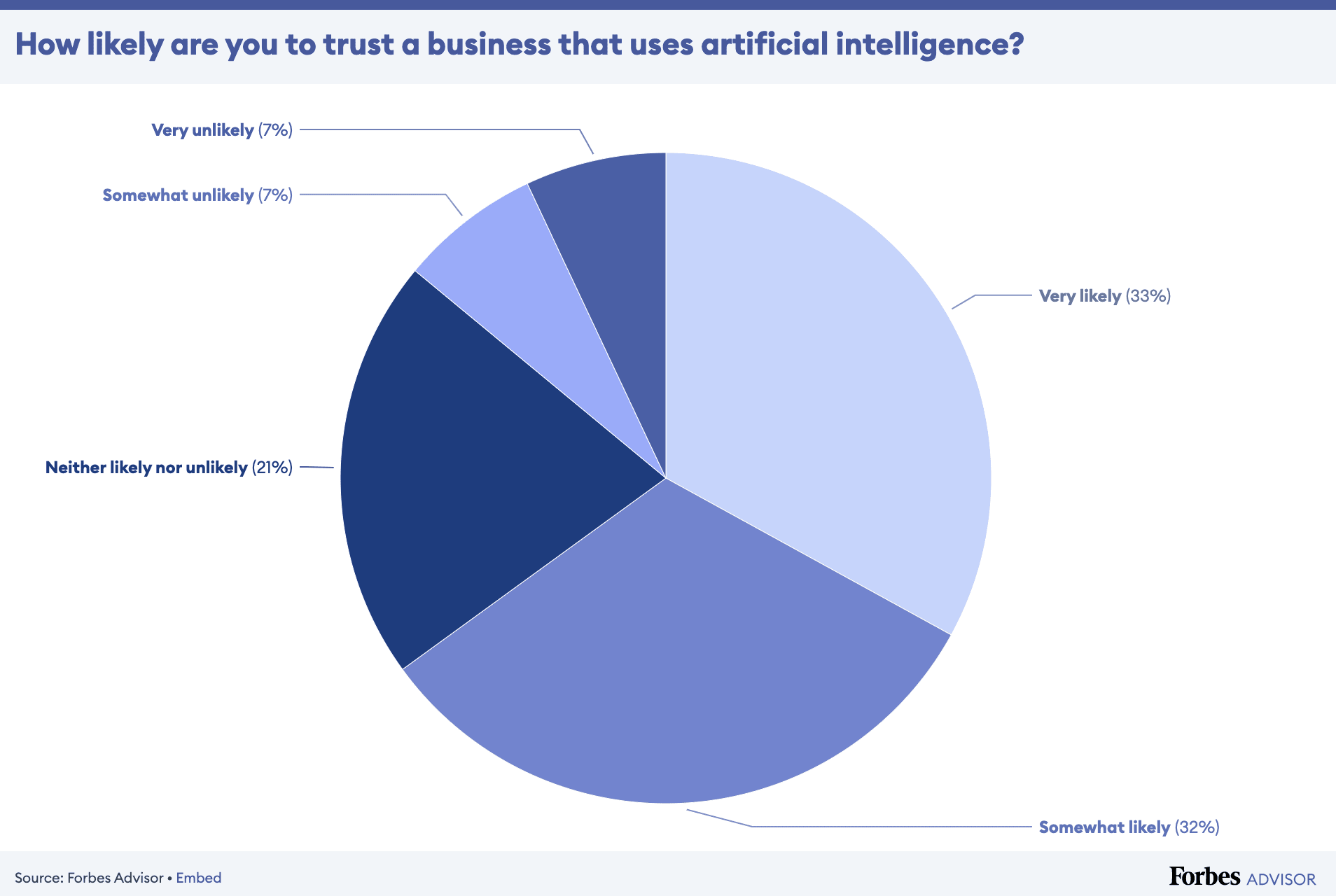
Source: Forbes
It’s crucial to keep ethics in mind when implementing AI into workflows. Businesses should draw up an AI ethics policy and continually audit all AI systems. There are also concerns around privacy, which is why businesses need to protect their sensitive information and put in place strict access controls.
“Stay in touch with the users of the technology as well as with those trusted with deploying it and make sure all stakeholders are included in its development,” says Tisdale. “We must remember that AI is a tool for humans to better our lives, and not an end in itself.”
AI adoption has more than doubled since 2017. It’s not just use that’s rising, but investment in AI tools as well. This across-the-board investment is causing significant waves in certain industries. In product development, marketing, and sales, AI is resulting in revenue increases.
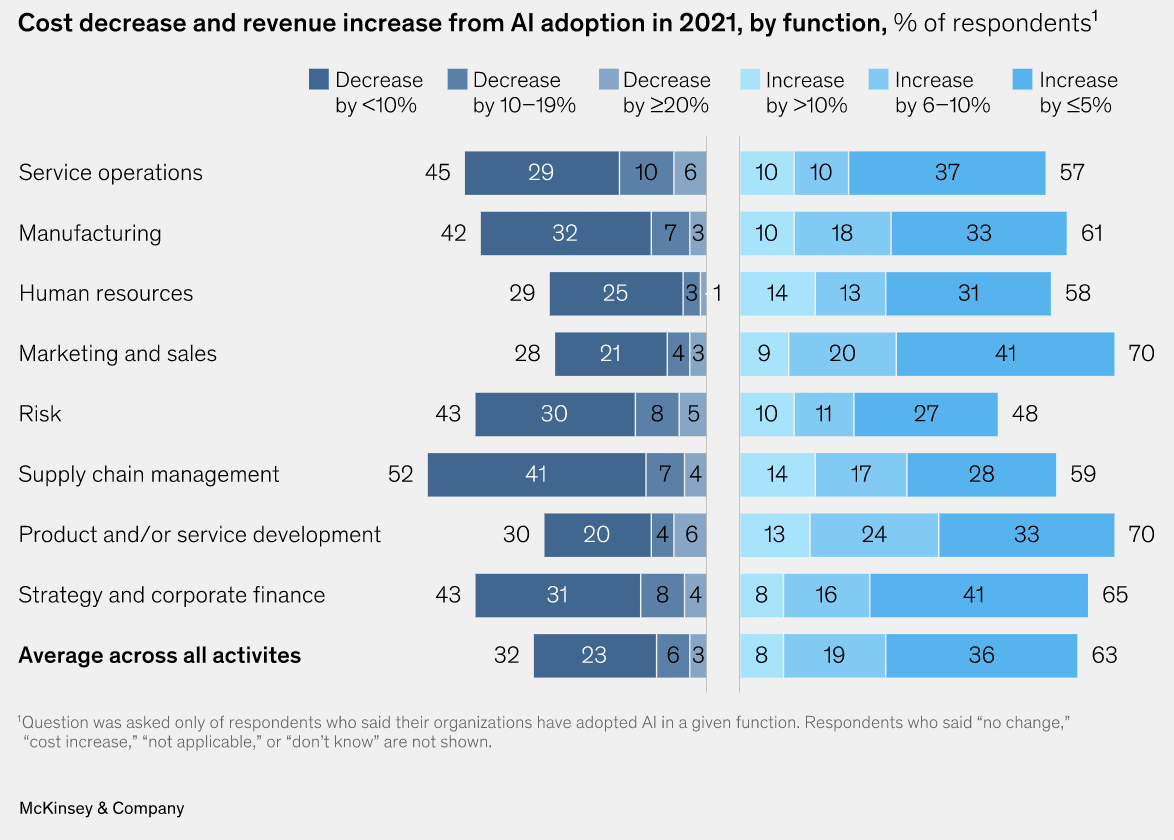
Source: McKinsey
Unlocking the potential of AI and human collaboration
AI isn’t the only thing that continues to evolve. Human interaction with machinery is growing alongside it. Not everyone has mastered the ability to work alongside AI, which is why freelancing is becoming a lucrative career as businesses are looking to leverage AI more frequently. AI specialists are bridging the gap between businesses and AI technology.
“They say English is the hottest new coding language, and AI has enabled even non-technical humans to give powerful instructions to a computer to achieve almost any result,” says Tisdale. “This skill set will only become more important in the years ahead.”
AI empowers freelancers to take advantage of the job market by learning new, AI-specific skills. Businesses in need of AI prompt engineers, consultants, and experts will seek out freelancers for these projects, rather than investing in a full-time team member.
“Freelancers who are fluent in using AI tools within their field will certainly have a leg up, especially as all industries are moving toward a more tech-oriented approach,” says Denise Hemke, chief product officer at Checkr. “This transition is creating a demand for those who can not only navigate this new digital landscape but also leverage it to optimize outputs.”
Businesses need to remember the value of human input when implementing new AI tools. Strike the appropriate balance by pairing the advanced technology with freelancers who are experts in AI.
Sign up for Fiverr and access a large marketplace of freelancers to scale your business operations with unique AI specializations.
